News
The Irago Conference 2012, November 2012
Toyohashi University of Technology is organizing the Irago Conference 2012, Thursday 15 and Friday 16 November 2012 at the Irago Sea-Park & Spa Hotel, Tahara, Aichi, Japan.
Objective
The world is at a major turning point. Recent changes in global economics and industrial priorities, environmental and energy policies, food production and population movements have produced formidable challenges that must be addressed for sustaining life on earth.
The objective of this conference is to provide an ‘interdisciplinary-platform’ to enhance mutual understanding between scientists, engineers, policy makers, and experts from a wide spectrum of pure and applied sciences in order to resolve the daunting global issues facing mankind. In particular, the organizers would like to encourage graduate school students to participate and talk directly with internationally renowned academics, industrialists, and opinion leaders for a firsthand view of the major issues facing scientists and engineers of the 21st century.
Plenary and Invited Speakers
Daniel E. Morse
(University of California, Santa Barbara, USA)
"Biologically inspired, nano-structured materials for energy and photonics"
Sakae Tanaka
(AQUABIT Corporation, Japan)
"Future prospect 2012-2025 -How will the World and our business change in future-"
Daniel Hock Chuan Chua
(National University of Singapore, Singapore)
"Applications of multifunctional core-shell carbon nanotubes as bottoms-up material for key technology"
Robert Geller
(University of Tokyo, Japan)
"Limitations of predicting earthquakes and the myth of safety at Fukushima"
Oussama Khatib
(Stanford University, USA)
"Robots and the human"
G. P. Li
(University of California Irvine, USA)
"Heterogeneous Integrated Package Systems"
Jing-Feng Li
(Tsinghua University, China)
"Thermoelectric nanocomposites and microscale modules"
Takashi Ohira
(Toyohashi University of Technology, Japan)
"Electric Vehicles on Electrified Roadways (EVER) -Powering Electric Cars by Exploiting Radio Frequency Displacement Currents via Revolving Tires-"
Yoshimitsu Okada
(National Research Institute for Earth Science and Disaster Prevention, Japan)
"Recent progress of seismic observation networks in Japan"
Uracha Ruktanonchai
(NanoDelivery System Lab, NANOTEC, Thailand)
"Nanotechnology for natural disaster mitigation"
Susumu Sakata
(National Institute of Advanced Industrial Science and Technology, Japan)
"Microbial methanogenesis as the process of methane hydrate formation"
Seiichi Takenoshita
(Fukushima Medical University School of Medicine, Japan)
"Turning a tragedy into a miracle -Fukushima Medical University version for revitalization-
Further information
General information:http://www.apirc.jp/index.html
Speakers:http://www.apirc.jp/invited.html
Visitors from Council for Scientific and Industrial Research (CSIR) of the South Africa
On 23rd July, Dr. Ntsika Msimang and Dr. Fulufhelo Netwamondo of CSIR visited Toyohashi University of Technology.The CSIR is a national research institute under the Ministry of Science and Technology in South Africa, which is equivalent to The National Institute of Advanced Industrial Science and Technology (AIST) in Japan.
In this visit Mr. Cecil Masoka, Minister Counselor, Science Technology, and Mr.Daisuke Tanaka, Science Technology Liaison Officer, Embassy of South Africa in Tokyo, accompanied two researchers. The visitors first met President Yoshiyuki Sakaki and Vice President Kiyokatsu Jinno.
The government of South Africa aims to create employment and economic development by manufacturing products that add value to their abundant mineral resources. Thus, the visitors were interested in research being conducted by Professor Takashi Ohira on manufacturing batteries from mineral resources and electric automobiles. The research being conducted by Ohira’s group includes not only electric automobiles, but also offers a hint for improvements in the electric distribution network in South Africa. The visitors exchanged opinions with Ohira, including initiating a technical transfer program based on collaborative research.
The visitors also met Professor Zhog Zhang at the Machinery Engineering Department (Measuring System) and were introduced to detection technology to monitor abnormal vibration or noise in automobiles. Zhang also described his research on the detection of surface defects on metal mirror reflection parts, sound segregation and orientation technology, and technology to detect the physical and mental condition of car drivers in motion.
Finally, at Professor Shuichi Ichikawa’s Laboratory, the visitors were introduced to the application of dedicated communication circuit technology to security systems. Specifically, a hardware control program; diversification of an incorporated processor; and (3) the design and evaluation of a random number generator circuit.
Further information
Council for Scientific and Industrial Research (CSIR) of the South Africa:
http://www.csir.co.za/
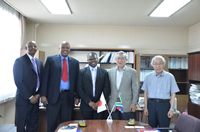
South African delegation at Toyohashi Tech: From left to right: Mr. Cecil Masoka, Dr. Fulufhelo Netwamondo, Dr. Ntsika Msimang, President Yoshiyuki Sakaki, Vice President Kiyokatsu Jinno
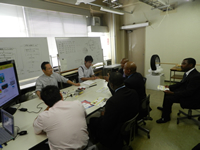
Professor Takashi Ohira Laboratory
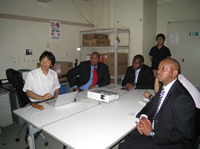
Professor Zhong Zhang’s Laboratory
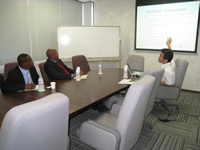
Professor Shuichi Ichikawa’s Laboratory
Delegation from Jazan University in Saudi Arabia visits Toyohashi Tech
Toyohashi University of Technology was honored to host a delegation of nine students and teaching staff from Jazan University’s College of Computer Sciences and Information Systems in Saudi Arabia on 12 July 2012.
The group’s visit was part of a three-week fact finding mission to Japanese universities and industrial corporations. Toyohashi Tech was chosen because of the universities internationally recognized excellence in research in computer sciences and information systems.
Following an overview of Toyohashi Tech by vice president Kiyokatsu Jinno, the delegation held technical discussion with Jun Miura , head of the Department of Computer Science and Engineering, as well as Hideo Sekino and Toshihiro Fujito of the same department. Afterwards, the delegation toured three of the department’s laboratories for a first-hand look the areas of research being carried out by Toyohashi Tech students.
Later, Professor Miura was joined by his colleagues Masaki Aono and Yoshiteru Ishida for engaged in a lively discussion with the delegates about education and the process of earning a degree in Japan.
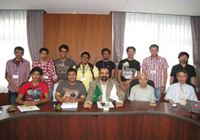
Staff from Toyohashi Tech poses with the delegation from Jazan University
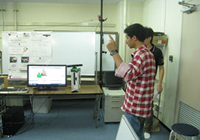
The visitors tour a laboratory
Japanese delegation visits Kiev to initiate science and technology exchange with Ukraine academic institutes
A delegation of Japanese researchers led by Kanji Fujiki, Deputy Minister of the Ministry of Education, Culture, Sports, Science and Technology, recently visited Kiev, the Ukrainian capital. Arriving on 8th July, the 19-strong party spent 4 days promoting the exchange of science and technology between Japan and Ukraine, as well as interaction between the two countries’ young researchers. The delegation visited the Kyiv Polytechnic Institute and the National Academy of Sciences of Ukraine, where they discussed future international research cooperation and interaction among young researchers with the Ukrainian counterparts.
Toyohashi University of Technology (Toyohashi Tech) was represented by Noriyuki Kurita, associate professor at the department of computer science and engineering, who was involved in debate with local researchers regarding exchanges in the fields of life science and computational science. Some of the main outcomes of the meetings include a plan for Toyohashi Tech, Kyiv Polytechnic Institute, and the National Academy of Sciences of Ukraine, to pursue joint research on the effects of radiation on the human body—an area of keen social interest in Japan since the reactor meltdown at the Fukushima Daiichi Nuclear Power Plant.
Ukraine is a uniquely ideal partner for this research because, not only did the country experience a reactor meltdown at the Chernobyl nuclear power station, but also because the progress made in science and technology since the collapse of the Soviet Union means that Ukraine has the potential to become one of Japan’s strategic science and technology exchange partners. Indeed, the visit by the Japanese delegation to Ukraine came about when, during an exchange of information on responses to nuclear power plant accidents, the president of the National Academy of Sciences of Ukraine asked Japan (through Toichi Sakata, the Japanese ambassador to the Ukraine) to establish a forum for debate between Japanese and Ukrainian experts on Ukraine’s strengths in science and technology.
The delegation’s mission was to find ways to help promote substantial exchanges in the fields of science and technology. Hopes are high that their visit to Ukraine will in initiate stronger interaction between the two countries in the life sciences and a broad variety of other fields, such as material science, cosmic science, radiology, and high energy physics.

A church in Kiev that is a United Nations World Heritage site
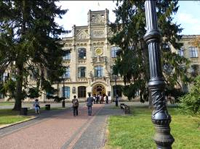
A building on the Kyiv Polytechnic Institute
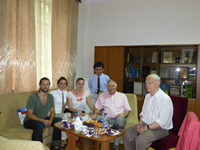
Prof. V. I. Danilov (right)
Prof. D. M. Govorun (second from right)
Dr. Kurita (third from right)
at National Academy of Sciences of Ukraine
Inaugural Student Lunch Time Colloquium
On 13th July, the first time Lunch Time Colloquium for international students was held in the Hibari Lounge, Toyohashi University of Technology.
Mr Chandra Prakash and Ms Gauri Patwardhan, Internship students at EIIRIS (Electronics-Inspired Interdisciplinary Research Institute) from Indian Institute of Technology Delhi, presented a summary about their research, impressions of Japan, and student life at IIT Delhi. More than 40 people participated in the event including Japanese and international students, as well as researchers from EIIRIS.
This Colloquium offered an opportunity for feedback from short term international students. Chandra Prakash and Ms Gauri Patwardhan were also the first internship students accepted as part of the EIIRIS scholarship.
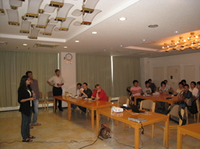
Chandra Prakash and Ms Gauri Patwardhan talking to the audience during the Colloquium.
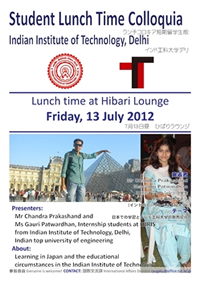
The flyer posted around the campus for the Colloquium.



